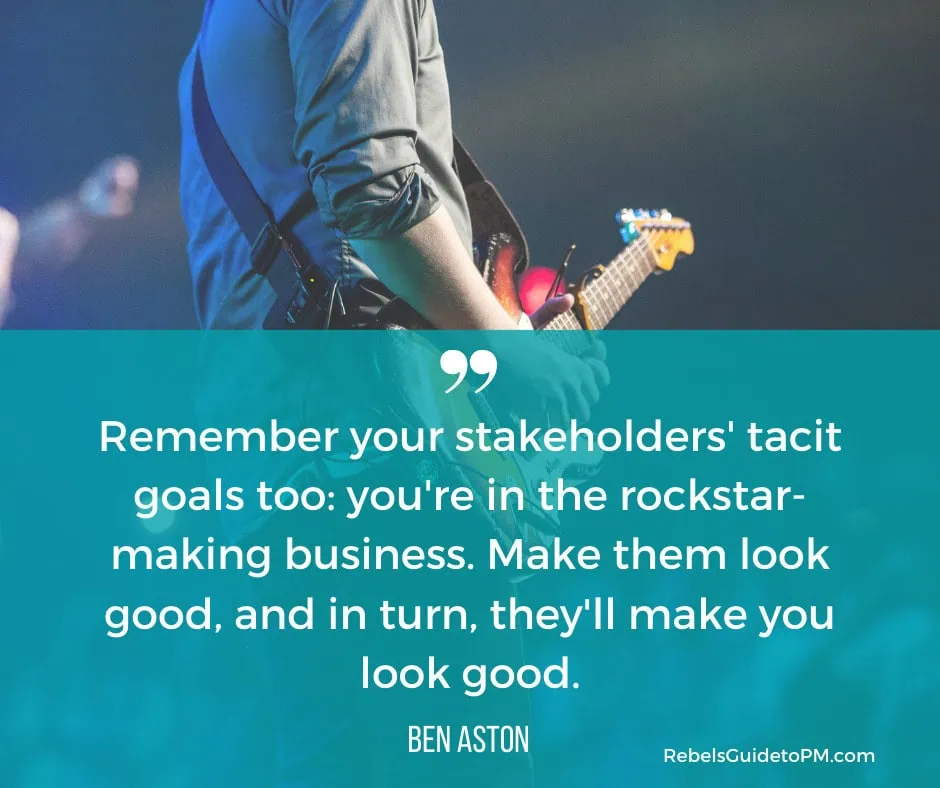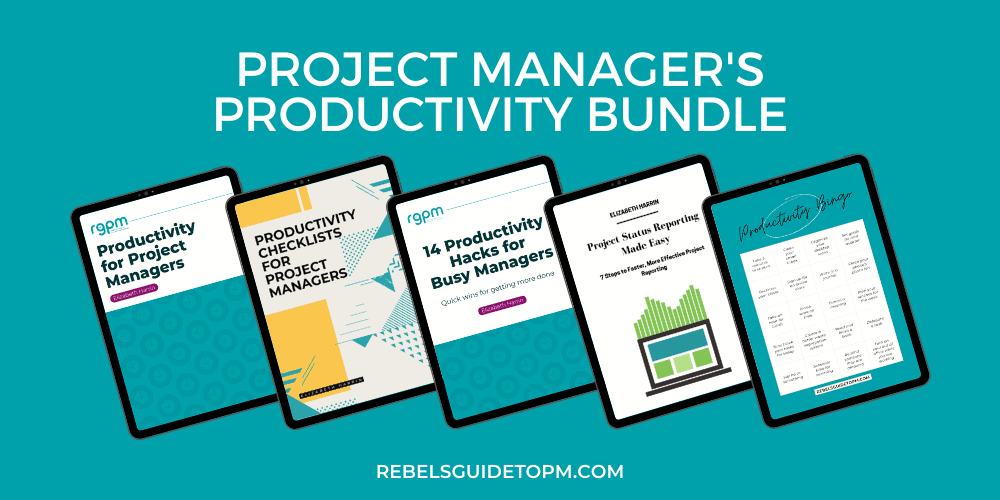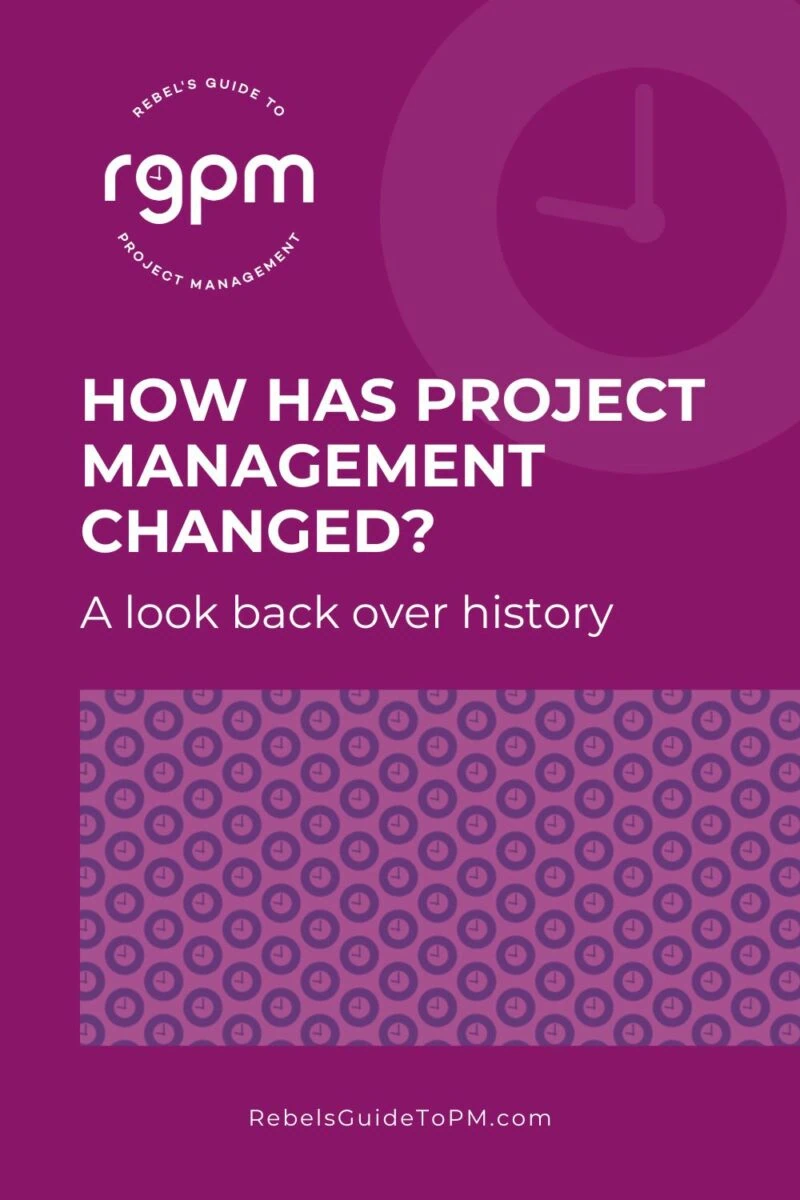How has project management changed?
This blog is reader-supported. When you purchase something through an affiliate link on this site, I may earn some coffee money. Thanks! Learn more.
We aren’t managing projects now in the same way that people managed projects years ago. The approaches taken by many companies and professional bodies to managing projects are different now to when I first started out in the field in 2000ish.
So why has that happened, and what have been the biggest shifts in how project management has evolved?
There are a number of things to focus on, even just comparing my own experiences from when I started managing projects over 10 years ago to the workplace today.
First, let’s look back over the history of project management, before we get into the changes we’ve seen in the field more recently.

How long has project management been around?
Longer than I’ve been working in the field!
Project management has been around in the form we know now since just after World War 2. At least, the 1950’s were when project management emerged as a discipline to help manufacturing, construction and government initiatives deliver more reliably and with greater repeatability.
If you think about it, getting work done to complete projects is a skill that has been needed since Stonehenge or the Pyramids. People have always needed to come together to achieve a common goal, and that’s what project management really is.
The Gantt chart in the form we recognize today has been around since Henry Gantt used it for his work in the 1910’s, although Karol Adamiecki developed a similar tool in 1896.
With all that history, it’s strange to think that even now we are seeing a huge acceleration of how project management has changed over the years. Today, project managers work in all industries including legal project management, healthcare, hospitality and marketing.
Having worked in the field for over 20 years, I’ve seen many changes. Here’s my view on what the main changes have been in project management.

What project management was like when I started
When I started working as a project manager, we had fax machines in the office. The biggest change has been that documentation is no longer printed and circulated for wet signature. In the 2000’s, I used to walk around the senior managers’ offices to get signatures on initiation documents, closure reports and more.
Today, all of that is done via workflow and electronic approvals which makes it much faster and easier to incorporate changes.
1. Technology
So much has changed in the field of technology, even in the recent past. Here are some of the main tech innovations that have led to an evolution in the way we manage projects.
Collaboration tools
We’ve seen the introduction of collaboration tools in the workplace. I won’t forget presenting at the APM conference in 2008 where I spoke about how the rest of business worked in comparison to how project managers worked, and why we should be embracing technology and social media tools.
I think a lot of the audience were surprised, and I certainly had some interesting conversations with bemused people afterwards.
We’ve moved beyond Friends Reunited-style networking to collaborative, enterprise-wide systems that help us work better professionally, both with external networks and colleagues on the same project. We wouldn’t have had that use of technology 10 years ago.
I talk about how to choose, get started and collaborate with technology in my PMI best-selling book, Collaboration Tools for Project Managers.
The impact of the pandemic
The impact of the Covid-19 pandemic that began in 2019 and saw countries moving into lockdown mode in 2020 completely changed the landscape for technology.
While many companies had tools like Skype and Zoom before people moved to work from home, the uptake in virtual working tech like Microsoft Teams and
Project management software companies also saw greater take up because employers needed ways to ensure common understanding of tasks and shared documents.
Get fast & free advice from the experts at Crozdesk.com. Crozdesk's small team of dedicated Project Management software enthusiasts will compare 360+ products for you. Tell them your requirements and they'll match you with the right expert who can help.
- No Obligations
- Free Service
- Exclusive Discounts
- Expert Advice
- Minimal Time Commitment
- Get a Custom Comparison Report
Bring your own device
Allied to the use of collaboration and social media-style feeds in the workplace, we’ve also seen the rise of BYOD (Bring Your Own Device).
I’ve had a tablet for a number of years and it has made a difference to how I work. Plus there are literally dozens of apps all proclaiming to help you get things done better/faster/cheaper. It does take a while to find a few you personally like.
I think the next step here will be to get some type of portal technology that takes all my favorite apps and social media feeds and puts them together so I don’t have to use multiple systems for project management.
Some project management software tools are aiming to bring together both the collaborative aspects of team task management and also the ‘technical’ features we need as project managers, but I’ve yet to see a tool that does it all well.
In my experience, teams often end up with a hybrid solution that they can use on multiple devices because that suits how they work.
AI and Big Data
Robotic Process Automation is here to stay, along with AI, natural language processing, big data and all the other data-driven processes. Alongside those developments comes an emphasis on data protection on projects.
Check out these statistics on project management and AI to see exactly how this area is growing.
And what a good thing that is for project management. This is one way that tech has changed the role of the project manager for the better, and is still changing it.
Hopefully, over time, our tools will get smarter and we’ll be able to spend more time on the value-added work like the next point.

The impact of AI on my job
Project management software now includes workflows, RPA and automations that make it easier to integrate systems and processes.
However, my day-to-day work as a project manager hasn’t seen much impact from AI (yet). This is an area where project management will continue to evolve.
Data analytics
There is now much great focus on data analytics, understanding data, using it for good and making the right decisions based on what our data sets tell us.
For project managers, this is not necessarily a skill that comes naturally, but it is one you can learn!
Read my review of the Google Data Analytics Professional Certificate, which is an entry-level training course you can do alongside your day job to boost your skills in this area and stay relevant.
2. Stakeholder engagement
Finally, project management professional bodies have woken up to the idea that people matter.
There’s more emphasis on people today. And less on following rigid processes. Thankfully. The introduction of a section on stakeholder management in the PMBOK Guide® is an example of this, although we’ve seen the shift to better models of team and stakeholder engagement develop over the past few years.
APM focus heavily on stakeholder engagement (and I wrote the book on stakeholders for them).

Project management methodologies
Agile methods became more prevalent in the first 20 years of the 21st Century, following the publication of the
However, the 2020s have been dominated by hybrid and tailoring methodologies to be fit for purpose.
The professional bodies and methodologies have put more emphasis on making the right decisions for the project and blending tools and techniques to tailor project delivery to suit your organization, deliverables and team.
It might seem strange to say that people on projects matter more today than they did 10 years ago, but I really think this is the case in modern project management.
There’s a greater emphasis on collaboration, teamwork and project managers having soft skills to complement their ability to schedule tasks and manage risks.
Stakeholder satisfaction counts for more today as well.
There’s less focus on giving people work in a top down way like traditional resource allocation approaches. And the command and control mentality is all but dead.

3. Virtual teams
Project management has changed over time because the workplace has changed over time.
One of the big shifts in how technology has changed project management is that we now have the option to choose from the best resources around the world, wherever they happen to be. We don’t need to pick our colleagues from the next town, just because they can make it into the office to be with us.
With virtual working and remote teams comes off-shoring, near-shoring, and an increased reliance on third parties to make all of the stuff we want to do work.
Managing a remote team, and working remotely yourself, can be great, but it also comes with challenges. Project management technology makes it easier, but if you didn’t collaborate well as a team before you got a new shiny tool, you probably won’t find yourselves working any better after the tech has been deployed.

4. Complexity
Complexity is one of the challenges introduced by teams split across the world. Other factors that you see in complex projects include:
- The number of variables and interfaces between teams and systems
- High levels of uncertainty and lack of awareness
- High levels of unpredictability so you can’t plan ahead and predict what will happen
- A rapid rate of change (for the environment or the solution)
- The number of stakeholders and their relationships
- The system the project is operating in and the interdependencies between that environment and the overall organizational culture.
Basically, the projects we work on today are likely to involve more people, more transformative change, more interfaces and lead us to work on stuff we haven’t done before, adding to the challenge.
It’s one of the reasons why techniques like critical chain scheduling are more important now — at least for you to be aware of the concepts even if the organization hasn’t totally bought into the idea.
If you want to know how technology has changed project management, this is another example. Organizations now have dozens of systems, and there’s a job to be done with integration and migration away from legacy tools.
5. A shift to leadership
Finally, there’s also more emphasis on leadership.
Project managers really need to step up and lead. As a profession, we aren’t doing enough of this, and that has to change.
As part of that, there’s a shift towards knowing why you are doing what you are doing on your project. Previously, there was a belief that project managers implemented other people’s strategies and we were responsible for hitting deadlines and keeping track of the money.
Today, we’re seeing project managers take on a role where they can challenge senior managers about why projects are being done and advise about premature project closure when required. We’re expected to know the strategic goals and how our projects are helping move the organization closer to them.
This is a massive move towards project leadership skills instead of simply implementing processes.
These days, we have to get more done, and it’s even more important to be productive and effective at work.

This will evolve further – if you can lead a project you can lead other areas of business, so the career path for project managers over the next 10 years will hopefully see more of us branching out of projects, programs and portfolios into managing business units at executive levels.
6. The focus on value
The focus on value is something that is part of the developing conversation on the project economy.
PMI in particular is putting a lot of emphasis on projects as the way to deliver strategy. APM’s Golden Thread research quantifies the impact that projects have on the UK economy (£186.86bn annually) with the Gross Value Added metric.
Project planning now focuses on quality management and making sure project efforts go to deliver the right thing, not just anything.
This is a good thing, because we should be striving to add something useful and valuable to our organizations.

7. Sustainability
The journey to net zero is top of mind for many forward-thinking organizations, and projects have a huge part to play.
Green Project Management is an alliance formed in 2009, so sustainability has certainly been on the horizon for many years. However, the focus really ramped up for project teams more recently, and probably wasn’t much of a consideration for the majority of projects in the 1950’s and 60’s.

The drive for sustainability
I remember learning about acid rain at school, but it’s only recently that project management has truly adopted green ways of working.
Sustainability is now baked into many projects, through energy efficiency measures, carbon reduction, recycling and more. We now have more focus on delivering sustainable results than I’ve ever seen before in my 20 years in the profession.
The approach to project management is something that I think has stayed the same.
It’s still a profession filled with motivated, enthusiastic individuals who want to make a difference. A career in project management is still well-paid and interesting. Business outcomes still need to be achieved — and projects are the way to do that.
Are we in a new era of project management? The core aspects of understanding and delivering on goals, working with others to get things done and making the most of the resources (of all kinds) that we have, are going to stay with us as we move into future eras and evolutions of project management.
So that’s what I’ve seen. What other changes have you seen over the past 10 years that have made you realize how project management has moved on?


